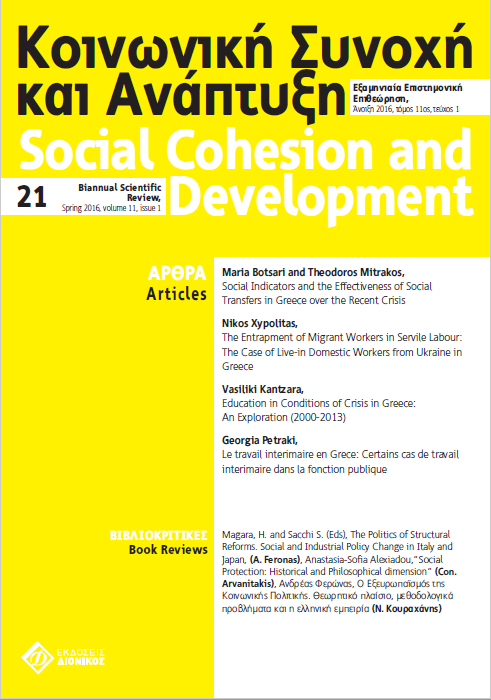Le travail tringulaire en Grece: Certains cas de travail tringulaire dans la fonction publique
Abstract
Our work hypothesis is that the hegemonic employment model in Greece, which safeguarded employment and strong legal protection for the majority of employees, is in a process of transformation to the opposite direction. In the special conditions created by the policies of internal devaluation under the supervision of the troika, work relations are in a process of change in both the private and the public sector: The institutional protection of employment is “freezing”, and its place is occupied by special regimes, created through the application laws following the successive memoranda imposed by the governments of the last few years. Thus, the employment model tending to generalise in Greece at present, i.e. work with little or no institutional rights, was already in existence during the previous period, but concerned a small part of the active population. The consequence of the abolition of fundamental work rights, is the renewal of the larger part of wage labour through precarious work regimes.
Article Details
- Zitationsvorschlag
-
Petraki, G. (2016). Le travail tringulaire en Grece: Certains cas de travail tringulaire dans la fonction publique. Social Cohesion and Development, 11(1), 67–83. https://doi.org/10.12681/scad.10855
- Ausgabe
- Bd. 11 Nr. 1 (2016)
- Rubrik
- Articles

Dieses Werk steht unter der Lizenz Creative Commons Namensnennung - Nicht-kommerziell - Weitergabe unter gleichen Bedingungen 4.0 International.
Authors who publish with this journal agree to the following terms:
- Authors retain copyright and grant the journal right of first publication with the work simultaneously licensed under a Creative Commons Attribution Non-Commercial License that allows others to share the work with an acknowledgement of the work's authorship and initial publication in this journal.
- Authors are able to enter into separate, additional contractual arrangements for the non-exclusive distribution of the journal's published version of the work (e.g. post it to an institutional repository or publish it in a book), with an acknowledgement of its initial publication in this journal.
- Authors are permitted and encouraged to post their work online (preferably in institutional repositories or on their website) prior to and during the submission process, as it can lead to productive exchanges, as well as earlier and greater citation of published work (See The Effect of Open Access).



